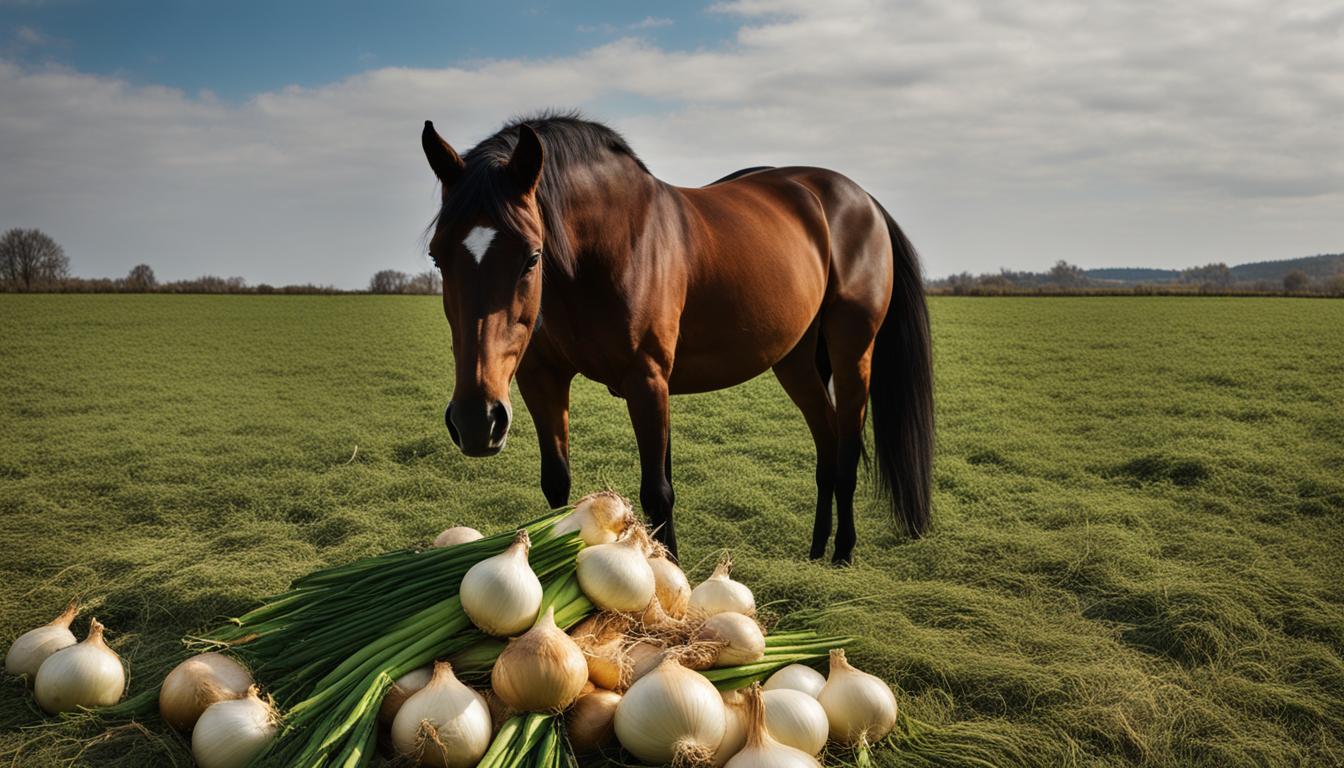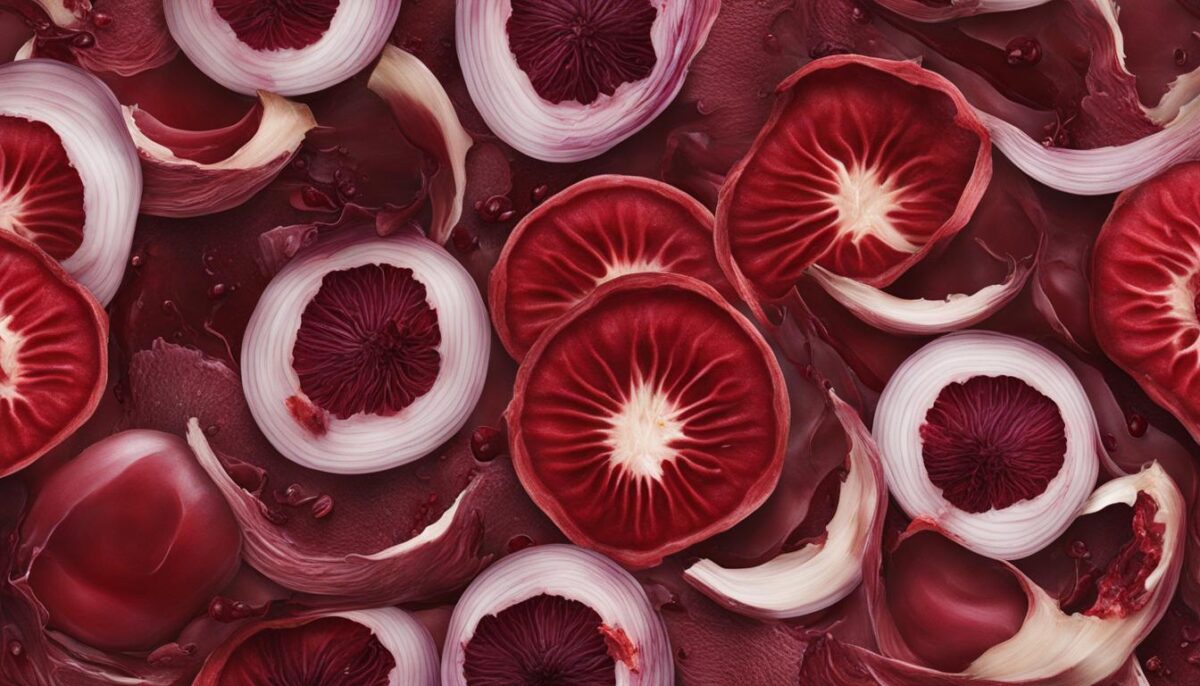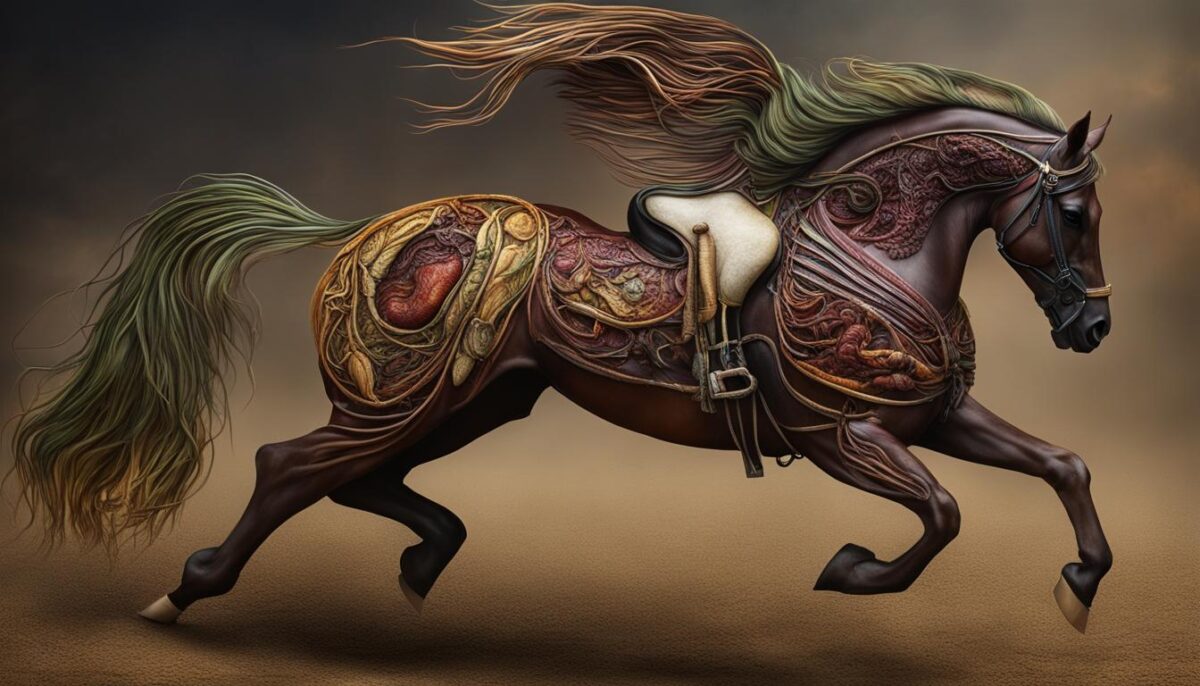As a horse owner, it’s crucial to know the ins and outs of equine diets, especially when it comes to feeding your horse treats that may pose health hazards. One common question is whether feeding onions to horses is safe, given that they carry certain benefits like vitamins and minerals. However, understanding the toxic foods for horses and how they impact equine nutrition can protect your beloved animal from harm. In this article, we’ll dive into the topic of onions in horse diets and discuss the dangers they present when consumed.
Key Takeaways
- Onions contain nutrients but also the toxic component n-propyl disulfide.
- N-propyl disulfide in onions causes Heinz Body Anaemia by damaging red blood cells.
- Horse owners should avoid giving onions to their horses to ensure their health and well-being.
- If planning to treat horses, stick to safe human foods like apples and carrots instead.
- Consulting a veterinarian or equine nutritionist is helpful if unsure about specific dietary needs.
Understanding Equine Nutrition and Treats
A balanced equine diet is crucial for maintaining a horse’s overall health and well-being. By providing high-quality horse feed and adhering to specific dietary rules, you can keep your horse happy and healthy. This section delves into the essentials of a horse’s diet, the role of treats, and safe alternatives to potentially harmful foods like onions.
Essentials of a Horse Diet
A horse’s diet primarily consists of grass or hay, which is the foundation of a healthy and balanced equine diet. Ensuring a constant food supply, either by providing quality hay or using a slow-feed hay net, is vital for your horse. A well-rounded diet not only satisfies their hunger but also supports their overall health, growth, and maintenance.
The Role of Treats in a Horse’s Diet
Occasionally incorporating safe human foods into your horse’s diet, such as apples or carrots, can be beneficial and serve as a fun reward. However, it is essential to stay informed about safe horse treats while avoiding harmful foods that may compromise their health. Treats should be given in moderation to prevent any adverse effects on your horse’s overall nutrition.
Safe Treat Options for Horses
Carrots, apples, pears, and grapes are excellent examples of horse-friendly fruits and can be given as treats. These fruits provide additional nutrients and taste enjoyable for your horse. However, it is crucial to avoid foods like onions that can have negative impacts on their well-being. By following these equine dietary rules and providing a balanced diet, you can ensure your horse remains healthy and content.
Can Horses Eat Onions?
While onions offer potential vitamin and mineral support for horses, the health risks associated with feeding them onions vastly outweigh those benefits. Onions contain thiosulphates and other compounds that can lead to equine anaemia by damaging red blood cells. Consuming large quantities over time can increase these risks significantly. Furthermore, the strong taste and smell of onions typically deter horses from eating their regular feed.
Here are some horse feeding guidelines to help you determine what constitutes a safe equine diet and avoid onion toxicity in horses:
- Stick to hay, grasses, and commercial feeds specifically designed for horses.
- Select safe foods for horses, such as carrots, apples, or other horse-friendly fruits and vegetables, as treats.
- Avoid feeding onions and other toxic foods like garlic, chives, leeks, and shallots from the Allium family.
- Monitor your horse’s well-being and consult with an equine nutritionist or veterinarian if you are unsure about their diet.
As responsible horse owners, the priority is to provide animals with a healthy and balanced diet, ensuring their well-being. It is important to recognize that, despite their nutritional content, onions pose a significant risk to horses’ health and thus should not be included in their diet as treats.
Toxicity of Onions and Related Foods
When it comes to feeding horses, some foods from the Allium family, such as onions, garlic, leeks, chives, and shallots, can be considered toxic. The harmful effects of these foods on equine health can be attributed to the presence of a compound called n-propyl disulfide, which can cause red blood cell damage and lead to significant health problems, including Heinz Body Anemia.
The Harmful Component: N-Propyl Disulfide
N-propyl disulfide is the compound responsible for the toxic effects of Allium family foods in horses. This substance attacks the equine red blood cells, causing their destruction and, consequently, the onset of anemia.
Exploring Heinz Body Anemia in Horses
Heinz Body Anemia is a type of anemia caused by the destruction of red blood cells, which are responsible for the transport of oxygen throughout the body. The presence of n-propyl disulfide in onions and other Allium family foods leads to the formation of Heinz Bodies, which damage the red blood cells in horses. The destroyed red blood cells can then impair the proper functioning of the horse’s body, leading to potentially serious health issues.
Other Foods in the Allium Family
Besides onions, there are various other foods in the Allium family that may pose a risk to horses. These foods contain similar toxic compounds, causing similar damage to red blood cells and potentially leading to Heinz Body Anemia. In addition to anemia, these foods can cause allergic reactions and disrupt the effectiveness of medications commonly used in equine health care. Some examples of other Allium family foods that can be harmful to horses include:
- Garlic
- Leeks
- Chives
- Shallots
As a result, it is crucial for horse owners to avoid feeding their horses any member of the Allium family as a treat or dietary supplement.
Risks of Feeding Onions to Horses
Although onions possess some nutritional benefits, feeding them to horses puts their health at risk. The primary concerns include onion-induced anaemia, digestive upset, and potential interactions with equine medications.
Anemia and Red Blood Cell Damage
Onions contain thiosulphates, which can result in the destruction of red blood cells and the development of anaemia in horses. This effect, combined with other harmful compounds in onions, highlights the dangers of including this vegetable in equine diets.
Digestive Distress and Gut Health
The high sulphur content and pungent flavor of onions may cause significant digestive upset in horses, leading to discomfort and possible colic-like symptoms. Therefore, it is crucial to prioritize your horse’s gastrointestinal health by avoiding onions and other harmful food items.
Interactions with Common Equine Medications
Feeding onions to horses also poses risks in terms of medication interactions. Onions can cause certain drugs to metabolize more quickly, reducing their effectiveness in treating or preventing health issues. To prevent complications, it is best to exclude onions from your horse’s dietary plan.
Safety Tips and Alternative Foods for a Healthy Horse Diet
With horse diet safety in mind, it’s important to understand that no amount of onion is considered safe for horses due to the inherent risks. When creating a balanced diet for your equines, you should concentrate on providing a variety of nutrient-dense foods and avoiding those known to cause health issues, like onions and other toxic foods. Moreover, there are alternative and healthy horse treats that you can consider for your beloved animals.
How Much Onion is Too Much?
The straightforward answer is any amount of onion is too much for horses. As mentioned earlier, onions contain compounds that are harmful to equine health and can cause anemia when consumed. Therefore, adhering to the feeding recommendations of professional equine nutritionists and veterinarians, it’s best to avoid onions in your horse’s diet altogether.
Creating a Balanced Diet for Your Horse
An essential part of horse care is providing a balanced equine nutrition. The foundation of any horse’s diet should be high-quality forage, such as hay and grass. Additionally, concentrate feeds, vitamins, and mineral supplements may be necessary depending on your horse’s activity level, age, and health status. Remember to consult an equine nutritionist or veterinarian to compose the perfect diet plan to meet your horse’s specific needs.
Healthy Treats to Consider
When it comes to alternative horse treats, there are various safe fruits and vegetables that your horses will enjoy. Some examples include:
- Carrots
- Apples
- Watermelon
- Pears
- Bananas
These treats should be given sparingly to avoid digestive upset and maintain your horse’s balanced diet. Always remember to practice moderation in treat-giving and ensure the overall health and well-being of your horses.
Conclusion
By adhering to equine diet best practices and embracing safe horse feeding habits, horse owners can ensure the health and well-being of their animals. It is crucial to avoid foods that can cause toxicity, such as onions and other members of the Allium family.
Horses thrive on a diet specifically designed for their nutritional needs. While treats can be incorporated into their diet, it’s important to choose these treats with care, focusing on options that are both safe and healthy. Some such treats include carrots, apples, and other horse-friendly fruits and vegetables.
If you are ever uncertain about the best dietary choices for your horse, seeking guidance from a veterinarian or an equine nutritionist can be highly beneficial. Remember, maintaining a balanced and healthy diet is essential for your horse’s overall health and happiness. So, stay informed and be mindful when selecting foods to avoid potential risks like onion toxicity.
FAQ
Can horses eat onions safely?
No, horses should not eat onions due to the toxic component n-propyl disulfide, which can cause Heinz Body Anaemia by destroying red blood cells. Feeding onions to horses can lead to serious health issues and potentially fatal consequences.
What are some alternative treats for horses?
Safe and healthy treat alternatives for horses include carrots, apples, pears, grapes, and other horse-friendly fruits in moderation. It’s essential to prioritize a balanced equine diet while incorporating safe treats occasionally.
What are the primary risks of feeding onions to horses?
The main risks of feeding onions to horses include anaemia caused by red blood cell damage, digestive distress leading to colic-like symptoms, and interactions with common equine medications. Also, allergies might endanger your horse’s health further.
What other foods should be avoided in a horse’s diet?
Besides onions, it’s essential to avoid related foods in the Allium family, such as garlic, leeks, chives, and shallots, as they contain harmful components that can damage red blood cells and cause anemia in horses.
How can I ensure a balanced and healthy diet for my horse?
Ensuring a balanced and healthy diet for your horse involves providing high-quality horse feed, a constant food supply using a slow-feed hay net, maintaining moderation in treats, and consulting a veterinarian or equine nutritionist if unsure about specific dietary needs.


